英语一般过去时的用法大全及解析
- 格式:doc
- 大小:115.00 KB
- 文档页数:13
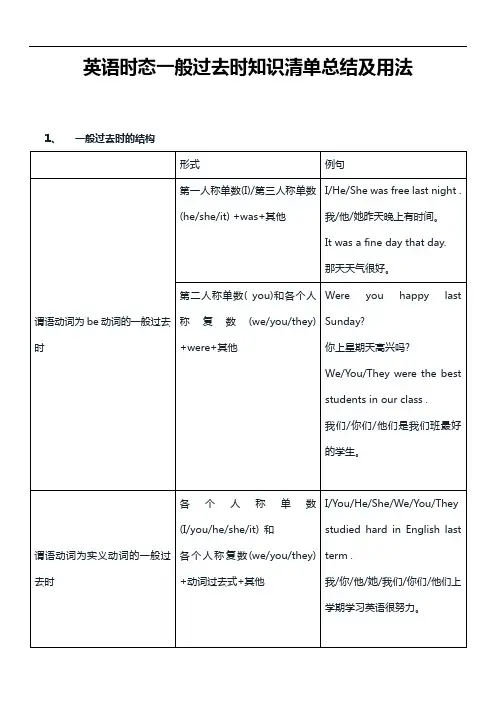
英语时态一般过去时知识清单总结及用法1、一般过去时的结构
2、一般过去时的结构变化
.
3、知识要点
一般过去时的用法
(1) 表示过去某一时间内发生的动作或存在的状态,常与表示过去的时间状语连用。
如:yesterday,last week,an hour ago(一个小时前),the other day(不久前的一天),just now(刚才),once upon a time(从前),in 1979(在1979年),in the old days(在过去的日子里)等。
如:Did you have a meeting yesterday ? 昨天你们开会了吗?
She left here just now. 她刚刚离开这儿。
My father got home at 10 o'clock last night. 我父亲昨晚十点到家。
We didn't have any money at that time . 那时候我们没有钱。
(2) 表示过去一段时间内经常或反复的动作或状态。
常与always (总是),never(从不)等连用。
如:
I never drank wine. 我从前从不喝酒。
She got up very early at that time . 她那时总是很早起床。
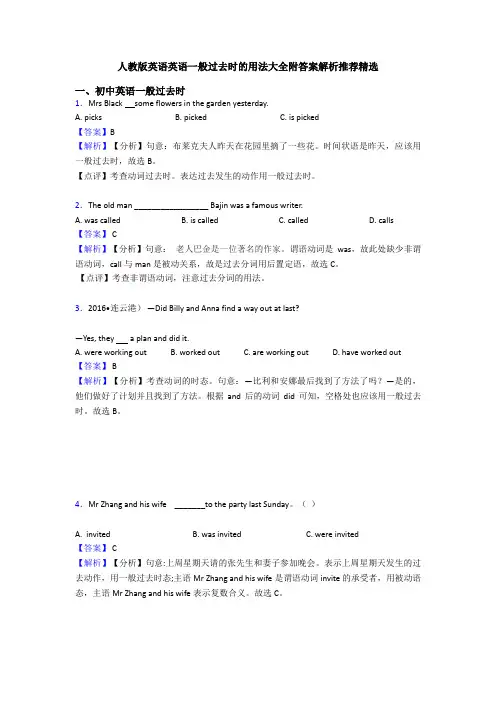
人教版英语英语一般过去时的用法大全附答案解析推荐精选一、初中英语一般过去时1.Mrs Black some flowers in the garden yesterday.A. picksB. pickedC. is picked【答案】B【解析】【分析】句意:布莱克夫人昨天在花园里摘了一些花。
时间状语是昨天,应该用一般过去时,故选B。
【点评】考查动词过去时。
表达过去发生的动作用一般过去时。
2.The old man _________________ Bajin was a famous writer.A. was calledB. is calledC. calledD. calls【答案】 C【解析】【分析】句意:老人巴金是一位著名的作家。
谓语动词是was,故此处缺少非谓语动词,call与man是被动关系,故是过去分词用后置定语,故选C。
【点评】考查非谓语动词,注意过去分词的用法。
3.2016•连云港)—Did Billy and Anna find a way out at last?—Yes, they a plan and did it.A. were working outB. worked outC. are working outD. have worked out【答案】 B【解析】【分析】考查动词的时态。
句意:—比利和安娜最后找到了方法了吗?—是的,他们做好了计划并且找到了方法。
根据and后的动词did可知,空格处也应该用一般过去时。
故选B。
4.Mr Zhang and his wife _______to the party last Sunday。
()A. invitedB. was invitedC. were invited【答案】 C【解析】【分析】句意:上周星期天请的张先生和妻子参加晚会。
表示上周星期天发生的过去动作,用一般过去时态;主语Mr Zhang and his wife是谓语动词invite的承受者,用被动语态,主语Mr Zhang and his wife表示复数合义。
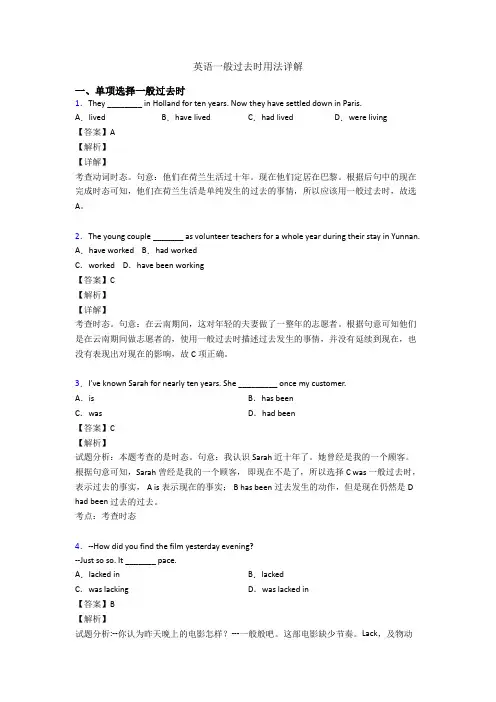
英语一般过去时用法详解一、单项选择一般过去时1.They ________ in Holland for ten years. Now they have settled down in Paris.A.lived B.have lived C.had lived D.were living【答案】A【解析】【详解】考查动词时态。
句意:他们在荷兰生活过十年。
现在他们定居在巴黎。
根据后句中的现在完成时态可知,他们在荷兰生活是单纯发生的过去的事情,所以应该用一般过去时,故选A。
2.The young couple _______ as volunteer teachers for a whole year during their stay in Yunnan. A.have worked B.had workedC.worked D.have been working【答案】C【解析】【详解】考查时态。
句意:在云南期间,这对年轻的夫妻做了一整年的志愿者。
根据句意可知他们是在云南期间做志愿者的,使用一般过去时描述过去发生的事情,并没有延续到现在,也没有表现出对现在的影响,故C项正确。
3.I’ve known Sarah for nearly ten years. She _________ once my customer.A.is B.has beenC.was D.had been【答案】C【解析】试题分析:本题考查的是时态。
句意:我认识Sarah 近十年了。
她曾经是我的一个顾客。
根据句意可知,Sarah 曾经是我的一个顾客,即现在不是了,所以选择C was 一般过去时,表示过去的事实, A is 表示现在的事实; B has been 过去发生的动作,但是现在仍然是D had been 过去的过去。
考点:考查时态4.--How did you find the film yesterday evening?--Just so so. It _______ pace.A.lacked in B.lackedC.was lacking D.was lacked in【答案】B【解析】试题分析:--你认为昨天晚上的电影怎样?---一般般吧。
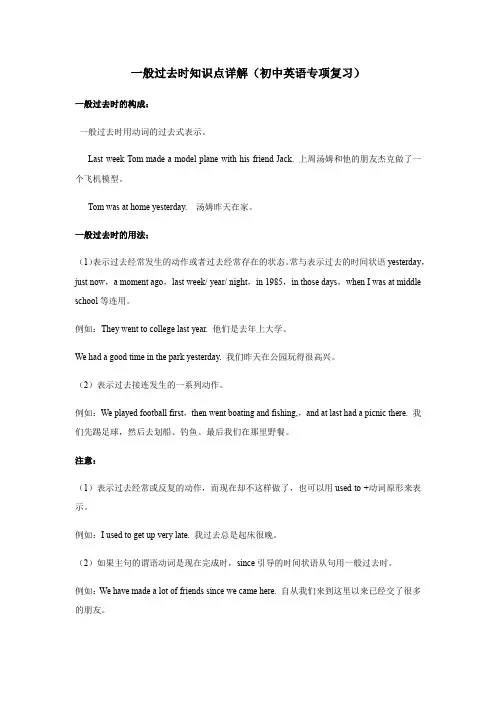
一般过去时知识点详解(初中英语专项复习)一般过去时的构成:一般过去时用动词的过去式表示。
Last week Tom made a model plane with his friend Jack. 上周汤姆和他的朋友杰克做了一个飞机模型。
Tom was at home yesterday. 汤姆昨天在家。
一般过去时的用法:(1)表示过去经常发生的动作或者过去经常存在的状态。
常与表示过去的时间状语yesterday,just now,a moment ago,last week/ year/ night,in 1985,in those days,when I was at middle school等连用。
例如:They went to college last year. 他们是去年上大学。
We had a good time in the park yesterday. 我们昨天在公园玩得很高兴。
(2)表示过去接连发生的一系列动作。
例如:We played football first,then went boating and fishing,,and at last had a picnic there. 我们先踢足球,然后去划船、钓鱼。
最后我们在那里野餐。
注意:(1)表示过去经常或反复的动作,而现在却不这样做了,也可以用used to +动词原形来表示。
例如:I used to get up very late. 我过去总是起床很晚。
(2)如果主句的谓语动词是现在完成时,since引导的时间状语从句用一般过去时。
例如:We have made a lot of friends since we came here. 自从我们来到这里以来已经交了很多的朋友。
(3)谈论某人的出生日期经常用一般过去时。
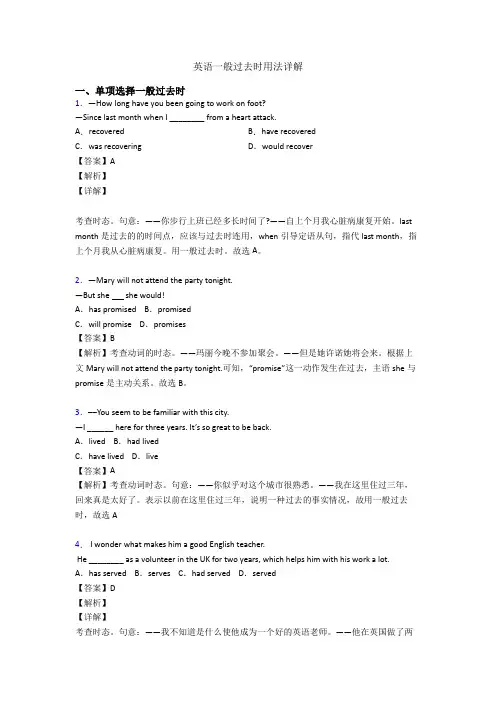
英语一般过去时用法详解一、单项选择一般过去时1.—How long have you been going to work on foot?—Since last month when I ________ from a heart attack.A.recovered B.have recoveredC.was recovering D.would recover【答案】A【解析】【详解】考查时态。
句意:——你步行上班已经多长时间了?——自上个月我心脏病康复开始。
last month是过去的的时间点,应该与过去时连用,when引导定语从句,指代last month,指上个月我从心脏病康复。
用一般过去时。
故选A。
2.—Mary will not attend the party tonight.—But she she would!A.has promised B.promisedC.will promise D.promises【答案】B【解析】考查动词的时态。
——玛丽今晚不参加聚会。
——但是她许诺她将会来。
根据上文Mary will not attend the party tonight.可知,“promise”这一动作发生在过去,主语she与promise是主动关系。
故选B。
3.––You seem to be familiar with this city.—I ______ here for three years. It’s so great to be back.A.lived B.had livedC.have lived D.live【答案】A【解析】考查动词时态。
句意:——你似乎对这个城市很熟悉。
——我在这里住过三年,回来真是太好了。
表示以前在这里住过三年,说明一种过去的事实情况,故用一般过去时,故选A4. I wonder what makes him a good English teacher.He ________ as a volunteer in the UK for two years, which helps him with his work a lot. A.has served B.serves C.had served D.served【答案】D【解析】【详解】考查时态。
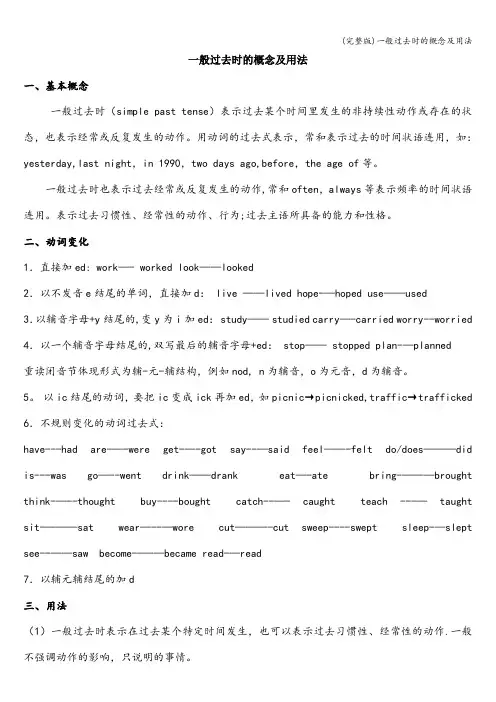
一般过去时的概念及用法一、基本概念一般过去时(simple past tense)表示过去某个时间里发生的非持续性动作或存在的状态,也表示经常或反复发生的动作。
用动词的过去式表示,常和表示过去的时间状语连用,如:yesterday,last night,in 1990,two days ago,before,the age of等。
一般过去时也表示过去经常或反复发生的动作,常和often,always等表示频率的时间状语连用。
表示过去习惯性、经常性的动作、行为;过去主语所具备的能力和性格。
二、动词变化1.直接加ed: work—- worked look——looked2.以不发音e结尾的单词,直接加d: live ——lived hope-—hoped use——used3.以辅音字母+y结尾的,变y为i加ed: study——studied carry—-carried worry--worried 4.以一个辅音字母结尾的,双写最后的辅音字母+ed: stop—— stopped plan-—planned重读闭音节体现形式为辅-元-辅结构,例如nod, n为辅音,o为元音,d为辅音。
5。
以ic结尾的动词,要把ic变成ick再加ed,如picnic→picnicked,traffic→traffic ked 6.不规则变化的动词过去式:have---had are-—-were get-—-got say--—said feel——-felt do/does———did is---was go—--went drink——drank eat—-ate bring-———brought think-—--thought buy----bought catch--—- caught teach ---—taught sit-———sat wear—--—wore cut———-cut sweep----swept sleep-—slept see--——saw become-—-—became read-—read7.以辅元辅结尾的加d三、用法(1)一般过去时表示在过去某个特定时间发生,也可以表示过去习惯性、经常性的动作.一般不强调动作的影响,只说明的事情。
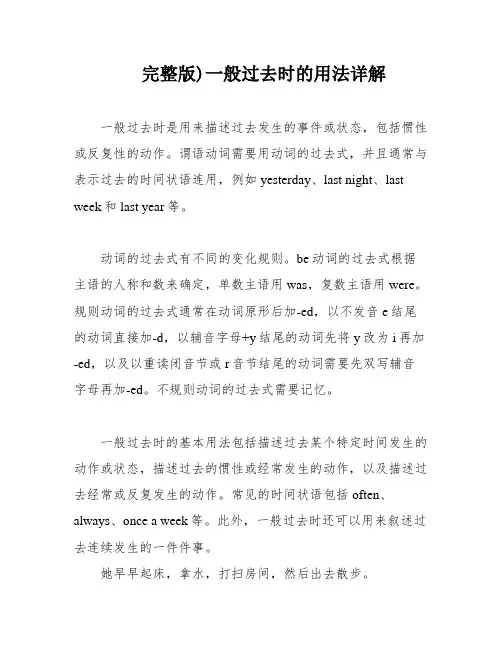
完整版)一般过去时的用法详解一般过去时是用来描述过去发生的事件或状态,包括惯性或反复性的动作。
谓语动词需要用动词的过去式,并且通常与表示过去的时间状语连用,例如yesterday、last night、last week和last year等。
动词的过去式有不同的变化规则。
be动词的过去式根据主语的人称和数来确定,单数主语用was,复数主语用were。
规则动词的过去式通常在动词原形后加-ed,以不发音e结尾的动词直接加-d,以辅音字母+y结尾的动词先将y改为i再加-ed,以及以重读闭音节或r音节结尾的动词需要先双写辅音字母再加-ed。
不规则动词的过去式需要记忆。
一般过去时的基本用法包括描述过去某个特定时间发生的动作或状态,描述过去的惯性或经常发生的动作,以及描述过去经常或反复发生的动作。
常见的时间状语包括often、always、once a week等。
此外,一般过去时还可以用来叙述过去连续发生的一件件事。
她早早起床,拿水,打扫房间,然后出去散步。
四。
一般过去时的判断标志词昨天,前天,上个+时间,今天早上+时间+前,刚才,一会儿前,过去的+时间五。
一般过去时的句型转换1.谓语动词为be动词时陈述句式:主语+be(was,were)+其他。
否定句式:主语+be(was,were)+not+其他。
一般疑问句:Be(was,were)+主语+其他?特殊疑问句:特殊疑问词+be过去式+主语+其他?例如:XXX:十年前他是一名教师。
否定句式:十年前他不是一名教师。
一般疑问句:十年前他是一名教师吗?特殊疑问句:十年前他是什么职业?2.谓语动词为实意动词时陈述句式:主语+动词(过去式)+其他。
否定句式:主语+didn't+动词(原形)+其他【didnot=didn't】一般疑问句:Did+主语+动词(原形)+其他【do,does 的过去时均为did】?特殊疑问句:特殊疑问词+do/does过去式+主语+动词原形+其他?例如:陈述句式:去年他住在蚌埠。
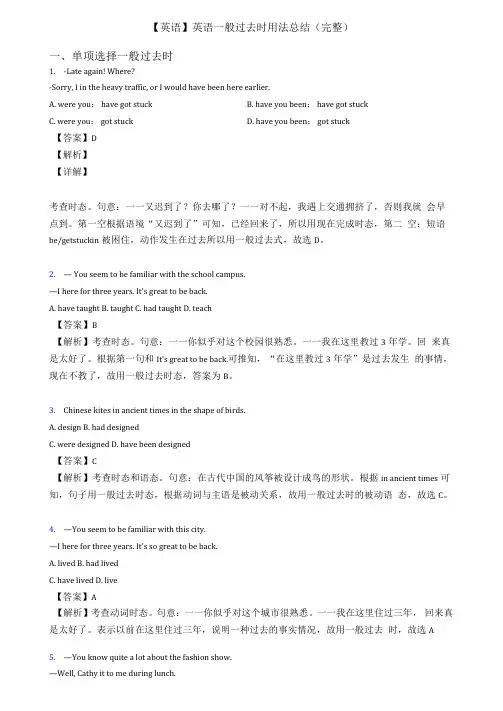
【英语】英语一般过去时用法总结(完整)一、单项选择一般过去时1.-Late again! Where?-Sorry, I in the heavy traffic, or I would have been here earlier.A. were you: have got stuckB. have you been; have got stuckC. were you; got stuckD. have you been; got stuck【答案】D【解析】【详解】考查时态。
句意:一一又迟到了?你去哪了?一一对不起,我遇上交通拥挤了,否则我就会早点到。
第一空根据语境“又迟到了”可知,已经回来了,所以用现在完成时态,第二空:短语be/getstuckin被困住,动作发生在过去所以用一般过去式,故选D。
2.— You seem to be familiar with the school campus.—I here for three years. It's great to be back.A. have taughtB. taughtC. had taughtD. teach【答案】B【解析】考查时态。
句意:一一你似乎对这个校园很熟悉。
一一我在这里教过3年学。
回来真是太好了。
根据第一句和It's great to be back.可推知,“在这里教过3年学”是过去发生的事情,现在不教了,故用一般过去时态,答案为B。
3.Chinese kites in ancient times in the shape of birds.A. designB. had designedC. were designedD. have been designed【答案】C【解析】考查时态和语态。
句意:在古代中国的风筝被设计成鸟的形状。
根据in ancient times可知,句子用一般过去时态,根据动词与主语是被动关系,故用一般过去时的被动语态,故选C。
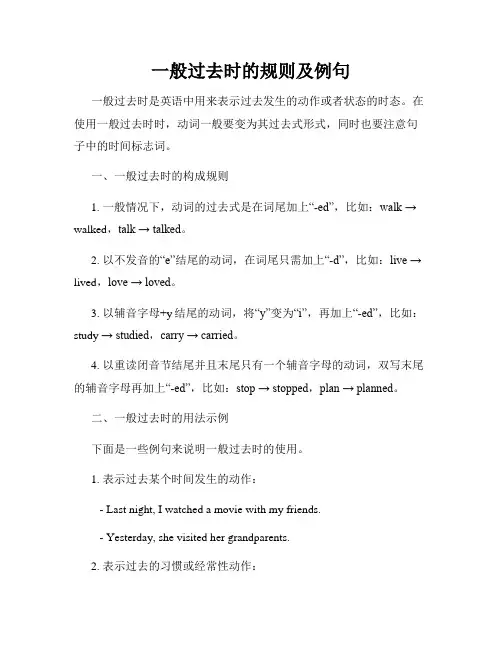
一般过去时的规则及例句一般过去时是英语中用来表示过去发生的动作或者状态的时态。
在使用一般过去时时,动词一般要变为其过去式形式,同时也要注意句子中的时间标志词。
一、一般过去时的构成规则1. 一般情况下,动词的过去式是在词尾加上“-ed”,比如:walk → walked,talk → talked。
2. 以不发音的“e”结尾的动词,在词尾只需加上“-d”,比如:live → lived,love → loved。
3. 以辅音字母+y结尾的动词,将“y”变为“i”,再加上“-ed”,比如:study → studied,carry → carried。
4. 以重读闭音节结尾并且末尾只有一个辅音字母的动词,双写末尾的辅音字母再加上“-ed”,比如:stop → stopped,plan → planned。
二、一般过去时的用法示例下面是一些例句来说明一般过去时的使用。
1. 表示过去某个时间发生的动作:- Last night, I watched a movie with my friends.- Yesterday, she visited her grandparents.2. 表示过去的习惯或经常性动作:- When I was young, I played soccer every weekend. - They always went to the beach for vacation.3. 表示过去的状态:- John was tired after work yesterday.- The weather was sunny during our vacation.4. 表示过去某个时间内持续的动作:- I lived in New York for five years.- They studied English for two hours yesterday.5. 过去式态势中的一般疑问句:- Did you see the movie last night?- Did they go to the party?6. 接受和拒绝的一般疑问句:- Did he agree to help us?- Did she refuse to go with them?7. 过去式态势中的否定句:- I didn't eat breakfast this morning.- They didn't finish their homework.三、注意事项1. 一般过去时常与过去的时间状语连用,如:yesterday(昨天)、last week(上周)、in 1990(在1990年)等。
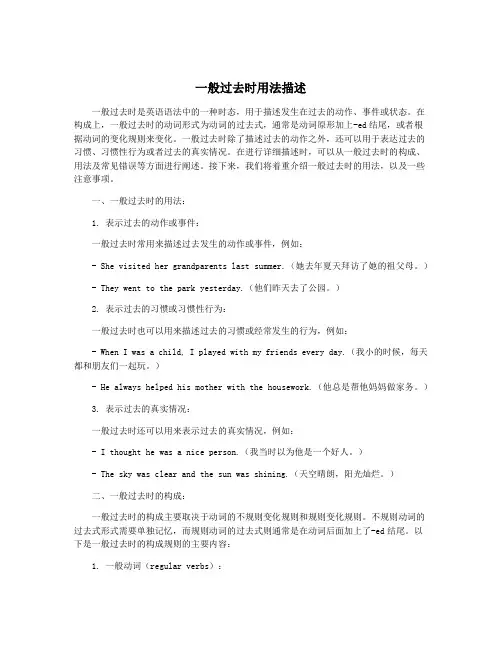
一般过去时用法描述一般过去时是英语语法中的一种时态,用于描述发生在过去的动作、事件或状态。
在构成上,一般过去时的动词形式为动词的过去式,通常是动词原形加上-ed结尾,或者根据动词的变化规则来变化。
一般过去时除了描述过去的动作之外,还可以用于表达过去的习惯、习惯性行为或者过去的真实情况。
在进行详细描述时,可以从一般过去时的构成、用法及常见错误等方面进行阐述。
接下来,我们将着重介绍一般过去时的用法,以及一些注意事项。
一、一般过去时的用法:1. 表示过去的动作或事件:一般过去时常用来描述过去发生的动作或事件,例如:- She visited her grandparents last summer.(她去年夏天拜访了她的祖父母。
)- They went to the park yesterday.(他们昨天去了公园。
)2. 表示过去的习惯或习惯性行为:一般过去时也可以用来描述过去的习惯或经常发生的行为,例如:- When I was a child, I played with my friends every day.(我小的时候,每天都和朋友们一起玩。
)- He always helped his mother with the housework.(他总是帮他妈妈做家务。
)3. 表示过去的真实情况:一般过去时还可以用来表示过去的真实情况,例如:- I thought he was a nice person.(我当时以为他是一个好人。
)- The sky was clear and the sun was shining.(天空晴朗,阳光灿烂。
)二、一般过去时的构成:一般过去时的构成主要取决于动词的不规则变化规则和规则变化规则。
不规则动词的过去式形式需要单独记忆,而规则动词的过去式则通常是在动词后面加上了-ed结尾。
以下是一般过去时的构成规则的主要内容:1. 一般动词(regular verbs):- 动词原形+ed结尾,例如:walked, talked, played等。

在高中英语学习中,了解和掌握一般过去时是非常重要的。
一般过去时用于描述过去发生的动作、状态或习惯。
本文将详细介绍一般过去时,以帮助学生更好地理解和运用这一时态。
一、一般过去时的用法:一般过去时用于以下情况:1. 过去发生的动作:表示在过去某个时间发生的动作或事件。
例句:I watched a movie last night.(昨晚我看了一部电影。
)2. 过去的状态:描述过去某一时刻的状态或条件。
例句:She was happy yesterday.(昨天她很开心。
)3. 过去的习惯:表示过去经常或习惯性发生的动作。
例句:They always went for a walk after dinner.(他们过去经常在晚饭后散步。
)二、一般过去时的构成:一般过去时的肯定句由主语加动词的过去式构成,否定句和疑问句需要使用助动词did。
1. 肯定句的构成:主语+ 动词过去式+ 其他成分例句:He played soccer with his friends yesterday.(昨天他和他的朋友们踢足球。
)2. 否定句的构成:主语+ did not + 动词原形+ 其他成分例句:She did not go to the party last night.(她昨晚没有去参加派对。
)3. 疑问句的构成:Did + 主语+ 动词原形+ 其他成分?例句:Did you finish your homework?(你完成作业了吗?)三、一般过去时的常见例句:1. I visited my grandparents last summer vacation.(去年暑假我拜访了我的爷爷奶奶。
)2. He studied English for three hours yesterday.(昨天他学了三个小时的英语。
)3. We didn't see each other for a long time.(我们很长时间没有见面了。
一般过去时的规则与常见句型解析一般过去时是英语中最常用的过去时态之一,用来表达在过去某个具体时间或一段时间内发生的动作或存在的状态。
本文将解析一般过去时的规则和常见句型,帮助读者正确运用该时态。
一、一般过去时的规则1. 动词规则变化:一般过去时的动词大部分采用动词过去式的形式,一般是在动词原形后加上-ed。
例如:work → worked, visit → visited.还有一些特殊情况,如:a. 以辅音字母+y结尾的动词,变为过去式时,将y变为i再加-ed。
例如:study → studied.b. 以“辅音字母+元音字母+辅音字母”结尾的重读闭音节动词,且末尾只有一个辅音字母时,先双写该辅音字母,再加-ed。
例如:stop→ stopped.c. 以“-e”结尾的动词,在结尾加上-d。
例如:live → lived.d. 一些不规则动词,变为过去式时需根据规则记忆。
例如:go → went, have → had.2. 句子结构:一般过去时的肯定句由主语 + 动词的过去式 + 其他成分构成。
例如:She played basketball last night.否定句由主语 + 动词的过去式 + not + 其他成分构成。
例如:He did not go to the party.疑问句由动词did + 主语 + 动词原形 + 其他成分构成。
例如:Did you finish your homework?二、一般过去时的常见句型1. 表示过去经常性的动作:常用的句型有"used to + 动词原形"和"would + 动词原形"。
例如:a. We used to go swimming every Sunday.b. He would often take a walk after dinner.2. 表示过去同时或相继发生的动作:常用的句型有"When + 一般过去时,一般过去时"和"While + 一般过去时,一般过去时"。
英语语法解析一般过去时的构成及用法1.一般过去时的构成一般过去时由动词的过去式构成。
动词过去式的变化规则有:规则动词的变化:①一般情况下在动词后直接加ed。
look—looked clean—cleaned②以e结尾的动词后直接加d。
like—liked dance—danced③以辅音字母+y结尾的动词,变y 为i,再加ed。
study—studied worry—worried特别提示:以元音字母+y结尾的动词,不需要变化,直接加ed。
destroy—destroyed play—played stay--stayed④以重读闭音节或/r/音节结尾,并且以一个辅音字母结尾,双写最后一个字母,再加ed。
stop—stopped permit—permitted admit—admitted prefer—preferred refer—referred occur—occurred不规则动词的变化:be动词的变化:is/am—was;are—weredo/does—did;has/have—had ;see—saw;break—broke等等。
不规则动词的变化形式需根据不规则动词表进行记忆。
2.一般过去时的用法①表示在过去某一时间段内习惯性的或经常性的动作。
常用的时间状语有:often,seldom,usually等。
He often played by the riverside when he was young.他小的时常在河边玩耍。
②表示在过去某个时间所发生的动作或状态,在过去已经结束,与现在没有关系。
常用的时间状语有:last week,in 1981,yesterday,ten years ago等。
He took a day off last week.他上周请了一天假。
He was elected president in 1980.他于1980年当选总统。
③在时间状语从句,条件状语从句中用过去式表示过去将来。
人教版英语英语一般过去时的用法大全含答案一、初中英语一般过去时1.Yesterday while I was walking in the park, I saw a watch on the ground and . I gave it to a policeman.A. picked it upB. picked up itC. to pick it upD. to pick up it【答案】 A【解析】【分析】句意:昨天我在公园散步的时候我看到地上有一个手表,捡了起来,我把它交给了警察。
and是并列连词,连接两个并列谓语,根据前面的saw,可知用一般过去时;pick up是动副短语,人称代词作宾语时,代词放中间。
故选A。
【点评】本题考查动副短语的用法和一般过去时。
注意动副短语中代词的位置。
2.As we all know, the Silk Road _______ China to the west in ancient times.A. connectsB. connectedC. will connectD. is connecting【答案】B【解析】【分析】句意:众所周知,在古代丝绸之路是连接中国和西方的。
In ancient times“在古代”,因此要用一般过去式。
结合句意,故选B。
【点评】考查动词时态。
3.- The radio says there will be a heavy storm in Mount Emei tomorrow.- Bad luck. I _________ to go there with my classmates.A. planB. will planC. planned【答案】C【解析】【分析】句意:——收音机说明天峨眉山会有大暴雨。
——真倒霉。
我和我的同学计划去那里。
根据答语Bad luck可知他在听了峨眉山有大暴雨后非常失望, 可以推测他的计划被打乱了, 而这个计划肯定是早已计划好的, 是一个过去的动作, 所以此句应用一般过去时, 谓语动词应用其过去式, 结合选项故选C。
高考英语一般过去时用法总结(完整)一、单项选择一般过去时1.My son turned to bookstores and libraries seeking information about the book recommended by his professor, but n one.A.would find B.had foundC.found D.has been finding【答案】C【解析】【详解】考查时态。
句意:我儿子到书店和图书馆去找教授推荐的那本书的资料,但一无所获。
此处表示并列,此空与turned 表示并列关系,所以用一般过去时态,故选C。
2.This summer holiday, many foreign students to China for a holiday.A.come B.have comeC.had come D.came【答案】D【解析】考查动词时态。
句意:今年夏天,许多外国学生来中国度暑假。
表示过去时间发生的事,此处是陈述事实,用一般过去时。
故选D。
3.Mary cleverly me t the customer ’ s requirements that you __ to deal with, so shewon the competition.A.failed B .failC.may fail D.must fail【答案】A【解析】考查动词时态。
句意:玛丽巧妙地满足了你没能应付的客户的要求,所以她赢得了比赛。
根据句意可知句子用一般过去时态,故答案为A。
4.—Where was I?—You _______ you didn e’ yotulirkjob.A.had said B.saidC.were saying D.has said【答案】B【解析】考查动词的时态。
句意:——我说到哪里?——你说到你不喜欢你的工作。
结合语境可知,下文描述的是过去的刚刚发生的动作,故用过去时态。
一般过去时用法一般过去时是英语中最常用的过去时态之一,用于描述过去发生的动作、事件或状态。
本文将介绍一般过去时的用法、时态转换、标志词及常见注意事项。
一、一般过去时的用法一般过去时用于以下情况:1. 过去发生的具体动作或事件:- We went to the beach last summer.(我们去年夏天去了海滩。
)- He cooked dinner yesterday.(他昨天做了晚餐。
)2. 过去的习惯或经常性动作:- She always walked to school when she was young.(她小时候总是步行去学校。
)- We used to play basketball every Saturday.(我们过去每个星期六都会打篮球。
)3. 对现在具有影响的过去经历或经验:- I learned how to swim when I was a child, and now I love swimming.(我小时候学会游泳了,现在我非常喜欢游泳。
)- They lived abroad for five years and now they can speak fluent English.(他们在国外生活了五年,现在能够说一口流利的英语。
)二、时态转换1. 肯定句:一般过去时的肯定句结构为:主语 + 动词过去式(或助动词did + 动词原形)+ 其他。
- I studied Chinese for three years.(我学了三年中文。
)- She played tennis with her friends yesterday.(她昨天和朋友们打网球。
)2. 否定句:一般过去时的否定句结构为:主语 + did not (didn't) + 动词原形 +其他。
- We didn't go to the party last night.(我们昨晚没有去参加派对。
【英语】英语一般过去时技巧和方法完整版及练习题及解析一、初中英语一般过去时1.They don't live here any longer. They _______ to Chengdu last month.A. moveB. movedC. will moveD. are moving【答案】B【解析】【分析】句意:他们不再住在这里了。
他们上个月搬到成都了。
last month是一般过去时的时间状语,动词用过去式,故答案选B。
【点评】考查一般过去时态。
2.—Linda is not coming for the party tonight.—But she _.A. promisesB. promisedC. will promiseD. had promised【答案】 B【解析】【分析】句意:——琳达今晚不会来聚会。
——但是她答应了啊。
根据前一句可知“她答应”发生在说话之前,故用一般过去时,因此选B。
【点评】考查动词的时态。
3.Mark Zuckerberg, founder of Facebook, _____ _________to donate a lot of money to charity when his daughter was born.A. decidesB. has decidedC. had decidedD. decided【答案】 D【解析】【分析】句意:当脸书的创始人——马克·扎克伯格的女儿出生的时候,他决定把很多钱捐给慈善事业。
根据when his daughter was born.可知,句子为一般过去时。
故答案是D。
【点评】考查动词时态,注意一般过去时的判定依据。
4.He_____ his English teacher when he was sightseeing in Paris.A. has metB. had metC. metD. would meet【答案】 C【解析】【分析】句意:他在巴黎观光时遇到了他的英语老师。
英语一般过去时的用法大全及解析一、初中英语一般过去时1.—Have you ever been to Shanghai?—Of course. Actually, I _________there for six years but now I live in Taizhou.A. workedB. was workingC. would workD. have worked【答案】 A【解析】【分析】句意:——你去过上海吗?——当然。
事实上,我在那里工作了六年,但是现在我住在泰州。
根据答语 but now I live in Taizhou. 但是现在我住在泰州,可知在上海工作为过去发生的事情,时态应用一般过去时,work的过去式为worked,故选A。
【点评】考查一般过去时。
注意根据时间状语判断句子的时态,选择正确答案。
2.A bridge ________over the river last year.A. buildsB. builtC. was builtD. is built【答案】 C【解析】【分析】句意:去年河上建了一座桥。
主语是谓语的执行者时,用主动语态,主语是谓语的承受者时,用被动语态。
a bridge是谓语build的承受者,用被动语态;表示在last year发生的过去动作,用一般过去时态,故选C。
3.By the time I ________ on the TV, Beckham ________ two goals.A. turned; have scoredB. turned; had scoredC. had turned; have scoredD. had turned; had scored【答案】 B【解析】【分析】句意:当我打开电视的时候,贝克汉姆已经进了两个球。
本句是时间状语从句,by the time到…时候为止,用于一般过去时,可排除CD选项。
从句用一般过去时,主句用过去完成时,需用“had+过去分词”结构,可排除A;根据句意结构,可知,故选B。
【点评】考查动词时态辨析题。
4.—Linda is not coming for the party tonight.—But she _.A. promisesB. promisedC. will promiseD. had promised【答案】 B【解析】【分析】句意:——琳达今晚不会来聚会。
——但是她答应了啊。
根据前一句可知“她答应”发生在说话之前,故用一般过去时,因此选B。
【点评】考查动词的时态。
5.-Have you finished your homework?-Yes, I have. I it this morning.A. finishB. finishesC. finishedD. have finished【答案】C【解析】【分析】句意:你完成你的作业了吗?——是的,我完成了。
我今天早晨完成的。
结合语境可知下文描述的是过去某时发生的动作,故用一般过去时态。
选C。
【点评】英语中的时态主要是借助于时间状语与上下文语境来进行判断。
解答此类题型,首先要注意句子中的时间状语,如果没有则要通过分析上下文,结合语境来判断句子的时态。
英语疑问句中一般具有时态上的对应关系,注意结合这一特点进行区分。
6.—I am sorry I _______ my exercise book at home.— Don't forget _______ it to school tomorrow.A. forget; to takeB. left; to bringC. forgot; to bringD. left; to take【答案】A【解析】【分析】forget忘记;leave留下;bring带来;take带走。
句意:抱歉,我把我的练习本忘在家里了。
——明天不要忘了把它带到学校来。
Forget后接动名词表示忘记做过的某事,接不定式是忘记去做某事,结合语境可知上文描述的是刚才发生的动作,故从句谓语动词用过去时态,下文表示不要忘记做某事,选A。
【点评】该题型是属于基础题型,是必考内容。
英语动词同汉语一样具有一词多义,一词多性的特点。
解答此类问题首先要理解每个单词的基本含义,并注意交叉含义间的区别,了解其特殊用法及习惯搭配等特点,然后结合语境选择正确答案。
英语宾语从句的时态和主句没有必然的联系,需结合语境进行具体分析。
7.He to play sports, but now he is interested in soccer and volleyball.A. doesn't useB. wasn't usedC. didn't useD. didn't used【答案】 C【解析】【分析】句意:他______做运动,但是现在他对足球和排球很感兴趣。
根据句意和选项可知此题考查一般过去时态的否定句式didn't+动词原形,故选C。
【点评】此题考查一般过去时态的否定句式,平时应多归纳总结各种时态,语态和句式的结构及用法。
8.He_________ me his name, but I can't remember it now.A. tellsB. will tellC. toldD. is telling【答案】 C【解析】【分析】句意:他告诉我他的名字,但我现在记不起来了。
根据下文but I can't remember it now.可知以前告诉过我,要用一般过去时,tell的过去式told,故选C。
【点评】考查一般过去时的构成和用法。
根据语境确定的动词的时态。
9.—Sorry, Tom. I can't find the book you ______ me.—It's OK. I don't need it any more.A. lendB. have lentC. will lendD. lent【答案】D【解析】【分析】句意:——对不起,汤姆。
我找不到你借给我的那本书。
——没关系。
我不再需要它了。
根据I don't need it any more可知汤姆现在不再需要那本书,因此借给我那本书应发生在过去,故此处用一般过去时,故选D。
【点评】此题考查一般过去时的用法。
10.He___________ his grandparents in the countryside last week.A. visitsB. visitC. visited【答案】C【解析】【分析】句意:上周,他拜访了在农村的祖父母。
A. visits 单数第三人称形式; B. visit 动词原形;C. visited一般过去式。
因为句中有一般过去式的标志性短语:last week.,故答案选C。
【点评】考查动词的时态,注意句中的时间状语。
11.—There is someone knocking at the door.—It must be the computer repairman. I him to come to fix my computer.A. callB. have calledC. calledD. will call【答案】C【解析】【分析】句意:——有人在敲门。
——一定是电脑维修人员。
我给他打电话来修理我的电脑。
因此先打电话,然后维修人员来修理他,故此处用一般过去时,故此处为called,故选C。
【点评】本题考查时态辨析。
以及call;have called;called;will call四种时态的用法和区别。
12.As we all know, the Silk Road _______ China to the west in ancient times.A. connectsB. connectedC. will connectD. is connecting【答案】B【解析】【分析】句意:众所周知,在古代丝绸之路是连接中国和西方的。
In ancient times“在古代”,因此要用一般过去式。
结合句意,故选B。
【点评】考查动词时态。
13.—Are you a basketball player in you school?—Yes, I ______the team 3 years ago. I ______in it for 3 years.A. joined, wasB. was joined, amC. have joined, have beenD. joined, have been【答案】D【解析】【分析】句意:——你是你们学校的篮球运动员吗?——是的,我在3年前加入了篮球队。
我已经参加它3年了。
第一空,根据时间状语3 years ago,三年前,可知此处用一般过去时,故为joined。
第二空,根据for 3 years,可知此处用延续性动词的现在完成时,结构为have done,主语是I,故用have been。
故选D。
【点评】考查一般过去时和现在完成时。
注意根据时间状语确定动词的时态。
14.—Jerry, have you ever been to the Great Wall?—Yes. I______ there with my parents last year.A. goB. wentC. will goD. have gone【答案】B【解析】【分析】句意:—Jerry,你曾经去过长城吗?—是的,去年我和我父母一起去那儿的。
由第二句的时间标志词last year 可以理解句意为去年我和爸妈去过长城。
属于一般过去时的标志词,故选B。
【点评】本题考查动词的时态。
根据句子的时间状语确定正确的时态。
15.My mind wasn't on what he was saying so I'm afraid I ____________ half of it.A. missedB. was missingC. will missD. would miss【答案】A【解析】【分析】句意:本题翻译为:我的心思不在他刚才所说的内容上,所以我担心我刚才错过了一半的内容。
A. missed一般过去时;B. was missing过去进行时C. will miss一般将来时;D. would miss过去将来时。
根据句意,可知表示过去错过了一半的内容,所以用一般过去时,故选A。
【点评】此题考查一般过去时的用法。
16.Yesterday while I was walking in the park, I saw a watch on the ground and . I gave it to a policeman.A. picked it upB. picked up itC. to pick it upD. to pick up it【答案】 A【解析】【分析】句意:昨天我在公园散步的时候我看到地上有一个手表,捡了起来,我把它交给了警察。